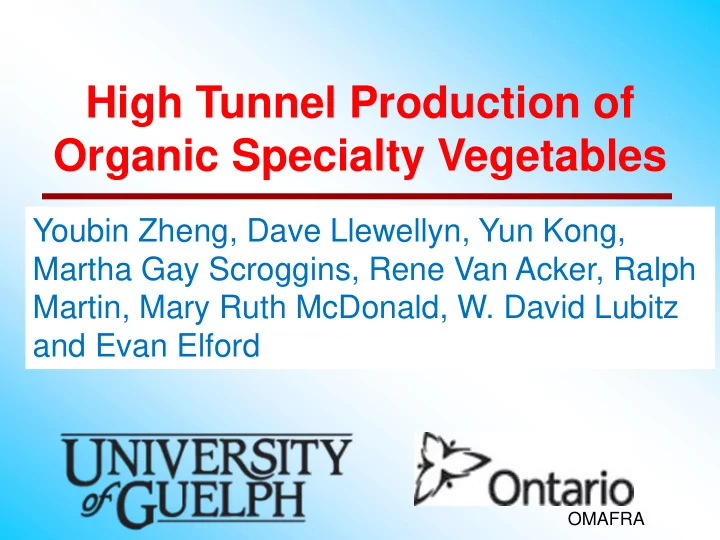

High Tunnel Production of Organic Specialty Vegetables Youbin Zheng, Dave Llewellyn, Yun Kong, Martha Gay Scroggins, Rene Van Acker, Ralph Martin, Mary Ruth McDonald, W. David Lubitz and Evan Elford OMAFRA
Content 1. Introduction 2. Results 3. How we did the research 4. Lessons learned and some take home messages
Why High Tunnels? • Controlled environment plant production is more resource efficient and with higher yield than field production; however the initial investment can be high…; • Extend growing seasons; • Prevent some weather related damage; • Grow specialty crops which are difficult to grow in the field; • Can be used to reduce pests…; • Can be movable; • Light, humidity, Temperature can be controlled to some extend; • ….
Project History and Participants’ Expertise
Huge difference between tunnel and field plants on July 23
Cherry Tomato --Sarina Hybrid
Yield loss of field tomato from animals, hail, and disease
Bitter Melon — Canton Green F1
Happier bitter melons in the warmer high tunnels How many fruits have you found on the plant?
Glebionis coronaria edible chrysanthemum Tonghao
PEA PODS ( China 6 snow pea) 1200 -2 or No. m -2 ) Open field High tunnel 1000 High tunnel+insect netting 800 Cumulative yield (g m 600 400 200 0 Pod weight Pod number
Pea shoot ‘HO LAN DOW’
160 Pea shoots yield (g m -2 ) 140 120 100 80 60 40 20 0 Open field High tunnel High tunnel+insect netting
Intercropping 2.0 Tonghao yield (kg m -2 ) 1.6 Oasis 1.2 0.8 0.4 0.0 Open field High tunnel High tunnel+insect netting Tong Hao
How we did the trials? Transplanting dates May 6-8 , 2015 Jun 3-4 , 2015
Planting density • Bitter melon: 1.9 plants/m 2 • Tomato: 2.4 plants/m 2 • Pea pod: 15 plants/m 2 • Tonghao (edible mums): 15gseeds/m 2
Plant Management
Lessons Learned
End Walls • Careful construction is essential to proper functioning and tight- fitting doors (jig) • Don’t scrimp on latch hardware • Need for securing propped-open doors on hot and windy days
Winter Storage of Poly • Full roll-up sides is a unique design • Clean, on-site storage • Can be easily rolled down in spring to begin warming/drying soil
Environment Measurement and Control
Average Temperatures Field Unscreened Screened Tunnel Tunnel Air Temperature 19.3 20.2 21.7 Season Air Temperature 17.5 19.1 20.4 June Air Temperature 20.3 21.1 22.9 July Air Temperature 19.1 19.7 21.1 August Soil Temperature 18.9 20.0 21.0 Season Additional Degree Days for High Tunnels, Compared to Field (for 107 days – May 26 to Sep. 11, 2015) Unscreened Tunnel: 101 degree days Screened Tunnel: 259 degree days
Soil Temperatures
Solar Radiation • Average solar radiation (season): – Field: 231 W/m 2 – Unscreened: 171 W/m 2 – Screened: 163 W/m 2 • Transmissivity of glazing ~ 70-75 % – Complicated by presence of plants later in season.
Early Season Frost Protection Inside Tunnels: Overnight May 13, 2015 30 Air inside tunnel Δ 4.9 º C Air under black tent 25 Air under clear tent Soil under black tent 20 Temperature (°C) Soil under clear tent 15 10 Δ 7.3 º C 5 0 Below - 2 º C for ~3 hr -5
Summary High tunnel improved crop yield possibly due to : • extended production period; • Reduced yield loss from disease, animals and severe weather (e.g., hail, heavy rain); • Created a better microclimate for crop production. More work is needed for environmental control and on other species
THANKS BioFert Manufacturing Inc. DeCloet Greenhouse Manufacturing Ltd. Katherine Vinson, Nora Alsafi, Patrick Kelly, Amy Kong and many more!
Recommend
More recommend